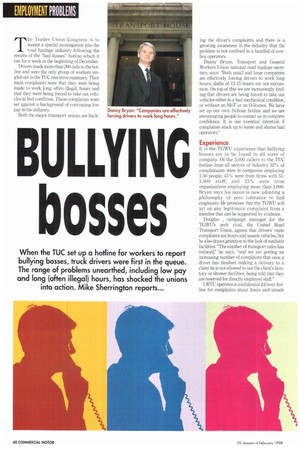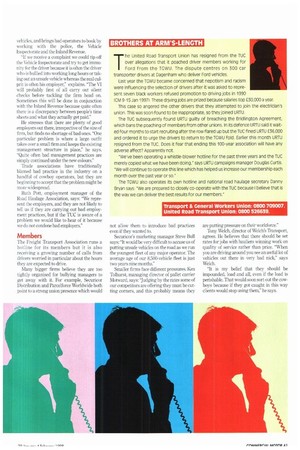EMPLOYMENT PROBLEMS
Page 44

Page 45

If you've noticed an error in this article please click here to report it so we can fix it.
When the TUC set up a hotline for workers to report bullying bosses, truck drivers were first in the queue. The range of problems unearthed, including low pay and long (often illegal) hours, has shocked the unions into action. Mike Sherrington reports...
The Trades Union Congress is to mount a special investigation into tlk road haulage industry following the results of the "bad bosses" hotline which it ran for a week at the beginning of December.
Drivers made more than 200 calls to the hotline and were the only group of workers singled out in the TUC executive summary. Their main complaints were that they were being made to work long, often illegal, hours and that they were being forced to take out vehicles in bad condition. These complaints were set against a background of continuing low pay in the industry.
Both the major transport unions are back
ing the driver's complaints and there is a growing awareness in the industry that the problem is not confined to a handful of cowboy operators.
Danny Bryan, Transport and General Workers Union national road haulage secretary, says: "Both small and large companies are effectively forcing drivers to work long hours; shifts of 11-15 hours are not uncommon. On top of this we are increasingly finding that drivers are being forced to take out vehicles either in a bad mechanical condition, or without an MoT or an 0-licence. We have set up our own 24-hour hotline and we are encouraging people to contact us in complete confidence. It is our eventual intention if complaints stack up to name and shame bad operators."
Experience
It is the TGWU experience that bullying bosses are to be found in all sizes of company. Of the 5,000 callers to the TUC hotline from all sectors of industry 32% of complainants were in companies employing 1-50 people; 45% were from firms with 511,000 staff; and 23% were from organisations employing more than 1,000. Bryan says his union is now adopting a philosophy of zero tolerance to bad employers. He promises that the TGWU will act on any legitimate complaint from a member that can be supported by evidence.
Douglas , campaign manager for the TGWU's arch rival, the United Road Transport Union, agrees that drivers' main complaints are hours and unsafe vehicles, but he also draws attention to the lack of roadside facilities: "The number of transport cafes has reduced," he says, "and we are getting an increasing number of complaints that once a driver has finished making a delivery to a client he is not allowed to use the client's lavatory or shower facilities, being told that they are reserved for directly employed staff."
URTU operates a confidential 24-hour hotline for complaints about hours and unsafe vehicles, and brings bad operators to book by working with the police, the Vehicle Inspectorate and the Inland Revenue.
"If we receive a complaint we could tip off the Vehicle Inspectorate and try to get immunity for the driver because it is often the driver who is bullied into working long hours or taking out an unsafe vehicle whereas the real culprit is often his employer" explains. "The VI will probably first of all carry out silent checks before tackling the firm head on. Sometimes this will be done in conjunction with the Inland Revenue because quite often there is a discrepancy between people's time sheets and what they actually get paid."
He stresses that there are plenty of good employers out there, irrespective of the size of firm, but finds no shortage of bad ones. "One particular problem is where a large outfit takes over a small firm and keeps the existing management structure in place," he says. "Quite often bad management practices are simply continued under the new colours."
Trade associations have traditionally blamed bad practice in the industry on a handful of cowboy operators, but they are beginning to accept that the problem might be more widespread.
Ruth Pott, employment manager of the Road I faulage Association, says: We represent the employers, and they are not likely to tell us if they are carrying out bad employment practices, but if the TUC is aware of a problem we would like to hear of it because we do not condone bad employers,"
Members
The Freight Transport Association runs a hotline for its members but it is also receiving a growing number of calls from drivers worried in particular about the hours they are expected to drive.
Many bigger firms believe they are too tightly organised for bullying managers to get away with it. For example, Securicor Distribution and Parcelforce Worldwide both point to a strong union presence which would
not allow them to introduce bad practices even if they wanted to.
Securicor's marketing manager Steve Bull says: "It would be very difficult to accuse us of putting unsafe vehicles on the road as we run the youngest fleet of any major operator. The average age of our 8,500-vehicle fleet is just two years nine months."
Smaller firms face different pressures. Ken Tolhurst, managing director of pallet carrier Motward, says: "Judging by the rates some of our competitors are offering they must be cutting corners, and this probably means they are putting pressure on their workforce."
Tony Welch, director of Welch's Transport, agrees. He believes that there should be set rates for jobs with hauliers winning work on quality of service rather than price. "When you are driving around you see an awful lot of vehicles nut there in very bad nick," says Welch.
"It is my belief that they should be impounded, load and all, even if the load is perishable. That would soon sort out the cowboys because if they got caught in this way clients would stop using them," he says.
BROTHERS AT ARM'S-LENGTH
The United Road Transport Union has resigned from the TUC over allegations that it poached driver members working for Ford from the TGWU. The dispute centres on 300 car transporter drivers at Dagenham who deliver Ford vehicles.
Last year the TGWU became concerned that nepotism and racism were influencing the selection of drivers after it was asked to represent seven black workers refused promotion to driving jobs in 1990 (CM 9-15 Jan 1997). These driving jobs are prized because salaries top £30,000 a year.
This case so angered the other drivers that they attempted to join the electrician's union. This was soon found to be inappropriate, so they joined URTU.
The TUC subsequently found URTU guilty of breaching the Bridlington Agreement, which bans the poaching of members from other unions. In its defence URTU said it waited four months to start recruiting after the row flared up but the TUC fined URTU £36,000 and ordered it to urge the drivers to return to the TGWU fold. Earlier this month URTU resigned from the TUC. Does it fear that ending this 100-year association will have any adverse affect? Apparently not.
'We've been operating a whistle-blower hotline for the past three years and the TUC merely copied what we have been doing: says URTU campaigns manager Douglas Curtis. We will continue to operate this line which has helped us increase our membership each month over the past year or so."
The TGWU also operates its own hotline and national road haulage secretary Danny Bryan says: We are prepared to closely co-operate with the TUC because I believe that is the way we can deliver the best results for our members."












































































































